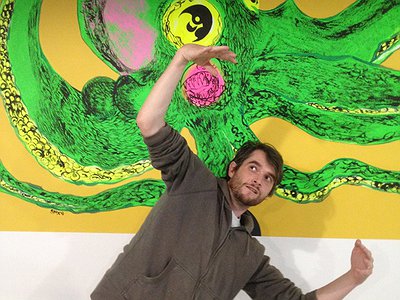What were your main challenges as a writer when starting out and how have they changed over time?
I wasn't very natural at writing, for a start. Writing was never that easy, and I think it should be hard, there should be a kind of exertion needed to force sonic experiences into words. I distrust writers who find it very easy!
There were two problems I had as a writer. My grammar was bad, I wrapped my ideas up in complex constructions which protected my natural shyness but dissipated the impact of the words. I did the classic thing which new writers sometimes do - the dangling modifier – burying the object of the sentence somewhere in the middle of it, as if to protect my cherished ideas from the harsh light of scrutiny. Working with Chris Bohn at The Wire finally got rid of this bad habit, as well as the other thing I did of qualifying everything by saying it "seems", it "feels", etc.
For me, 80% of what I'm trying to do is journalism, to get ideas across clearly and directly. That's what excites me. If an idea is worth expressing, I want to say it as plainly and directly as possible, and ultimately you want people to understand and respond and take those ideas forward and make a difference to the world. One reason music journalism is so rewarding to me is there's this constant tension between plain words and the ever shifting shades of the music.
In an odd way, I'm glad my ideas were so jumbled and knotted to start with. It gave me an almost obsessive focus on word to word construction that is not a bad starting point for a writer and editor.
Over time, the main challenge is trying not to return to the same ideas again and again. This is where journalism comes in - you can report, contextualise, explain. There is never a lack of fresh music to report on.
It has often been claimed that music represents a particularly difficult, if not impossible, subject to cover for journalists. From your experience, what's your take on that?
The old 'dancing about architecture' idea is badly outdated. When writing about music, you can write about people, places, spaces, scenes, cities, studios. There is a wealth of concrete, graspable stuff to root your ideas in. In any case, writing which tends towards purely formal description or analysis of music is hard to pull off: it often lacks a real force or appeal to you as a human being.
Sure, sound itself can be hard to describe, given that it is just vibrations in air, but this should be taken as a challenge. I've very rarely found myself thinking 'this is impossible to write about', I just take that difficulty as a prompt to approach from another angle.
Tell us about your studio/work space, please. What were criteria when setting it up and how does this environment influence the creative process? How important, relatively speaking, are factors like mood, ergonomics, haptics and technology for you?
For my own writing, nothing special, a kitchen table and some headphones. I do always use a very simple program to write, however, either TextEdit or Write Room, something where there are no distractions and you are just faced with a blank screen. I am quite fascistic about this and, for instance, I use the most boring font possible. Nothing is of any real importance when writing except that moment when it is just you and your sentences when you have to judge - is this good enough? Does this work? Is this what is the most important thing to say at this time? It's good to feel not too comfortable. The less distractions there are the more honest you have to be.
At The Wire, we are very lucky to have a big, open, rather bare office which leaves us lots of space for books and records and CDs. We have a small library of unusual books going back decades. These real-life objects are important resources which help guide us away from the most obvious online references. We also have big floor-standing speakers, an old Technics deck and a concrete floor, so you can turn it up till you can really feel the bass.
Can you take me through your writing process on the basis of a piece that's particularly dear to you? How do you decide what to write about, what do you usually start with when working on a new piece, what sources will you draw from for research purposes and how does a piece gradually take shape?
I like to write about musicians who are interesting people, who are engaged with a struggle for meaning in some way - the same kind of struggle that many are engaged with in their own lives. I like people who have stories to tell. Among those in recent years: Actress, Mark Ernestus, Sleaford Mods. I suppose the important part of this process is the interview, and interview techniques are enormously important. I could say a lot about that, but in general it is important and empowering to remember an interview is not a normal social situation – you are able to ask all sorts of questions that might be too personal if it were a friend.
I have two ways to start pieces, sometimes I use both together. If I have lots of competing ideas and themes in a particular piece I draw a kind of ideas map on a piece of A4 paper – I find the dense clusters of ideas and then take those areas as a starting point. Also, if I feel a structure of a piece is unclear to me, I try and compose a number of sentences which together summarise the narrative of the piece - "he grew up listening to jazz, so when he started studying composition he tried to find ways to introduce freedom to those structures..." Etc
Simultaneously, and this may sound contradictory, but I would argue otherwise, it is important to sometimes just ignore structure and simply pick a subject and write to see where it gets you. For instance, when I wrote a piece for The Wire about Theo Parrish, I knew I wanted to have one section describing the experience of listening to his disco re-edits. So I just focused on that one experience and wrote about that listening experience and see where it led. When I wrote a story on Actress, I wanted to try and describe in exhaustive detail the particular feel of the part of South London where he lives, as it is quite distinctive. So I just started writing about its geography and rain.
Music journalism has frequently been attacked for merely expressing opinion. On the other hand, both positive or negative opinions can be string motivators for in-depth journalism. How would you describe the importance of subjectivity for your writing?
I suppose there is a prima facie tension in music writing between the subjectivity of the actual experience of hearing music, and what you are trying to do with any act of criticism, which is to appeal to the reader and try to persuade them to hearing it as you see it. I have a few angles on it.
Firstly, all music writing is essentially based in subjective experience – without subjective experience it is nothing – so subjective opinions should not be concealed, but explored, celebrated, even. On the other hand, from a stylistic point of view, writing rarely needs the 'I think' or 'I feel' that writers put in there – the review has your name at the bottom or the top, so it is evident that it's a particular person's point of view. Reviews read better without the constant, distracting return to 'I' or even 'we'.
For me, the idea of persuading another reader has always been really important. When I'm there staring at blank screen, I try to think: how can I draw another reader round to my point of view? What evidence can I base my arguments in? And I think there can be evidence, which is why music writing is so fascinating. It's a game of constantly shifting reference points and history, on which you try to build an argument that strikes the reader at the moment they read it. It's difficult but rewarding.
Nietzsche's ideas of perspectivism made a big impact on me a long while ago: there are no truths, only perspectives. I like to see the reviews section of The Wire as a teeming meeting point of different ideas, which as you read through, you start to piece together a picture of something that cumulatively feels real.




